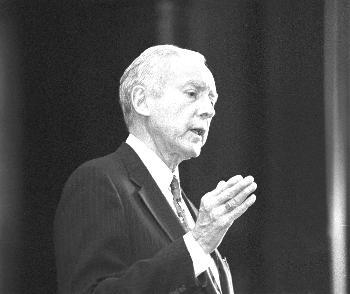
Sen. ORRIN HATCH (R-UTAH) speaks yesterday afternoon about his faith and his new book in the Kirkland Junior Common Room.
Sen. Orrin Hatch (R-Utah) discussed his Mormon faith, his songwriting career and his recent book in a speech yesterday to a Kirkland House crowd of about 100.
Hatch, formerly a presidential hopeful and chair of the Senate Judiciary Committee and now the author of Square Peg: Confessions of a Citizen Senator, was the year’s first guest speaker for the Institute of Politics Book Club.
His speech and the question-and-answer session that followed touched on his improbable partnership with Sen. Edward M. “Ted” Kennedy ’54-’56 (D-Mass.), his involvement in promoting health care bills and his views on the role of religion in politics.
“I don’t expect everyone to agree with me,” said Hatch, known as a staunch conservative since his election to the Senate in 1976. “Especially not Harvard students.”
IOP Director and former Secretary of Agriculture Daniel R. Glickman introduced Hatch to the audience as “a distinguished man who has brought great credit to his family and his state, as well as this nation.”
After paying his respects to Sen. Paul D. Wellstone (D-Minn.), who died last week in a plane crash, Hatch gave an account of his collaboration with Kennedy, stressing his conviction that he has gained much throughout his career from working with liberals.
Hatch said the child health insurance bill he co-sponsored with Kennedy was once opposed by every governor except Howard Dean (D-Vt.). Today, he said, “every governor thinks it’s his own bill.”
In another instance, Hatch recalled standing up to one of the conservative icons of his party on the issue of AIDS funding.
He animatedly recounted the attempt of Sen. Jesse Helms (R-N.C.) to discredit a bill aimed at helping AIDS patients on the grounds that many of the funds would be used to treat gays.
“‘Gays deserve the best we can do for them. Gays deserve good health care just like everybody else,’”Hatch recalled responding.
Hatch also pointed out that while he opposes abortion rights, he does support stem cell research.
Students questioned Hatch on a number of topics, notably his affiliation with the Church of Jesus Christ of Latter-Day Saints.
“I don’t wear it on my sleeve,” he said. But Hatch does try, he said, “to exemplify what it means to be a good Mormon.”
Hatch said he was skeptical of the view, expressed by some students in the audience, that some politicians use their faith as a political tool.
“Currently, I don’t think religion enters into most races,” he said. “I’m not so much interested in what a candidate’s religion is as whether he lives by it, and whether you can rely on him.”
But he was also sharply critical of what he said he felt was the artificial exclusion of religion from the political scene.
“Why are we so afraid of religion?” he asked. “Why should we fail to discuss the importance of religion in this society? This is a religious society, more or less.”
In a lighter moment during his speech, Hatch discussed his struggling songwriting career and his encounter with U2 lead singer Bono, who suggested that Hatch might sell more albums if he changed his name to “Johnny Trapdoor.”
Hatch jokingly said to look for Johnny Trapdoor albums in record stores, though he was clearly more interested in hawking his book.
He told his audience they could learn from his book “what it’s like to be in a jam, what it’s like to make mistakes, what it’s like to get on your knees and pray you’ll do the right thing and what it’s like to serve.”
Read more in News
College Dems Rally For Kerry












